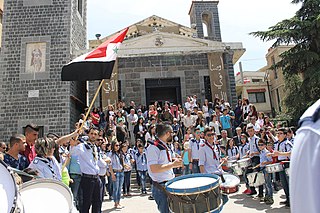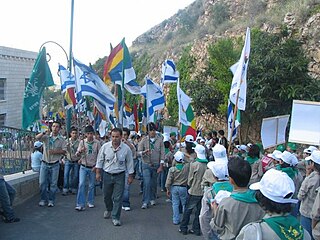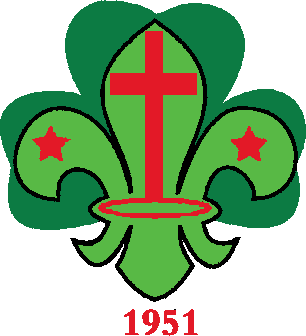
The demographics of Israel, monitored by the Israel Central Bureau of Statistics, encompass various attributes that define the nation's populace. Since its establishment in 1948, Israel has witnessed significant changes in its demographics. Formed as a homeland for the Jewish people, Israel has attracted Jewish immigrants from Europe, Asia, Africa, and the Americas.

Palestinian Christians are a religious community of the Palestinian people consisting of those who identify as Christians, including those who are cultural Christians in addition to those who actively adhere to Christianity. They are a religious minority within the State of Palestine and within Israel, as well as within the Palestinian diaspora. Applying the broader definition, which groups together individuals with full or partial Palestinian Christian ancestry, the term was applied to an estimated 500,000 people globally in the year 2000. As most Palestinians are Arabs, the overwhelming majority of Palestinian Christians also identify as Arab Christians.

Israelis are the citizens and nationals of the State of Israel. The country's populace is composed primarily of Jews and Arabs, who respectively account for 75 percent and 20 percent of the national figure; followed by other ethnic and religious minorities, who account for 5 percent.

The Arab citizens of Israel are the country's largest ethnic minority. They are colloquially referred to in Arabic as either 48-Arabs or 48-Palestinians, denoting the fact that they have remained in Israeli territory since the Green Line was agreed upon between Israel and the Arab countries as part of the 1949 Armistice Agreements. According to several sources, the majority of Arabs in Israel now prefer to be identified as Palestinian citizens of Israel. International media outlets often use the term "Arab-Israeli" or "Israeli-Arab" to distinguish Israel's Arab citizens from the Palestinian Arabs residing in the Israeli-occupied territories. They are formerly, or are descended from, those Arabs who belonged to the British Mandate for Palestine through Palestinian Citizenship Order 1925. Speakers of both Arabic and Hebrew, they self-identify in a wide range of intersectional civic, national, and religious identities.

Arab Christians are ethnic Arabs, Arab nationals, or Arabic speakers who follow Christianity. The number of Arab Christians who live in the Middle East was estimated in 2012 to be between 10 and 15 million. Arab Christian communities can be found throughout the Arab world, but are concentrated in the Eastern Mediterranean region of the Levant and Egypt, with smaller communities present throughout the Arabian Peninsula and North Africa.

The Greek Orthodox Patriarchate of Jerusalem, also known as the Greek Orthodox Church of Jerusalem, is an autocephalous church within the wider communion of Eastern Orthodox Christianity. Established in the mid-fifth century as one of the oldest patriarchates in Christendom, it is headquartered in the Church of the Holy Sepulchre in Jerusalem and led by the patriarch of Jerusalem, currently Theophilos III. The patriarchate's ecclesiastical jurisdiction includes roughly 200,000 to 500,000 Orthodox Christians across the Holy Land in Palestine, Jordan and Israel.
Religion in Israel is manifested primarily in Judaism, the ethnic religion of the Jewish people. The State of Israel declares itself as a "Jewish and democratic state" and is the only country in the world with a Jewish-majority population. Other faiths in the country include Islam, Christianity and the religion of the Druze people. Religion plays a central role in national and civil life, and almost all Israeli citizens are automatically registered as members of the state's 14 official religious communities, which exercise control over several matters of personal status, especially marriage. These recognized communities are Orthodox Judaism, Islam, the Druze faith, the Catholic Church, Greek Orthodox Church, Syriac Orthodox Church, Armenian Apostolic Church, Anglicanism, and the Baháʼí Faith.

The Israel Boy and Girl Scouts Federation is Israel's federation of the five Scouting organizations in Israel, sorted by religious affiliation. Some 90,000 boys and girls belong to organizations in the federation.

Kafr Yasif is an Arab town in the Northern District of Israel. It is located 11 kilometers (6.8 mi) northeast of the city of Acre and adjacent to Abu Sinan and Yarka. The population of Kafr Yasif is half Christian (52.1%) with the rest Muslim (44.9%), and a small Druze community.

Arab localities in Israel include all population centers with a 50% or higher Arab population in Israel. East Jerusalem and Golan Heights are not internationally recognized parts of Israel proper but have been included in this list.

Christianity is the third largest religion in Israel, after Judaism and Islam. At the end of 2022, Christians made up 1.9% of the Israeli population, numbering approximately 185,000. 75.8% of the Christians in Israel are Arab Christians. Christians make up 6.9% of the Arab-Israelis.
Following are timelines of the history of Ottoman Syria, taken as the parts of Ottoman Syria provinces under Ottoman rule.
The Arab and Druze Scouts Movement is a coeducational member of the Israel Boy and Girl Scouts Federation. The federation consists of Muslim Arab, Christian Arab, and Druze troops.

Israeli Druze or Druze Israelis are an ethnoreligious minority among the Arab citizens of Israel. They maintain Arabic language and culture as integral parts of their identity, and Arabic is their primary language.

Gabriel Naddaf is an Israeli Greek Orthodox priest. He serves as a judge in Israel's religious court system and as a spokesman for the Greek Orthodox Patriarchate of Jerusalem. He is one of the founders of the Forum for recruiting Christians in the Israel Defense Forces.

Druze Scouts Association in Israel is an Israeli Druze coed Scouting and Guiding association with about 5,000 members. It is the largest Druze youth organization.

Palestinian nationalism is the national movement of the Palestinian people that espouses self-determination and sovereignty over the region of Palestine. Originally formed in the early 20th century in opposition to Zionism, Palestinian nationalism later internationalized and attached itself to other ideologies; it has thus rejected the occupation of the Palestinian territories by the government of Israel since the 1967 Six-Day War. Palestinian nationalists often draw upon broader political traditions in their ideology, such as Arab socialism and ethnic nationalism in the context of Muslim religious nationalism. Related beliefs have shaped the government of Palestine and continue to do so.
Feminism in Israel is a complex issue in contemporary Israeli society due to the varied demographic makeup of the country and the country's particular balance of religion and state issues. For secular Israeli women, the successive campaigns for women's rights and equality reflect a similar timeline and progression as Western democracies. For Israeli Arabs, however, the issue of feminism is strongly linked to Palestinian causes. And for Orthodox Jews, selected women's rights and women's representation in the Israeli Parliament are recently debated issues.

The Israel Catholic Scouts Association was founded in 1951 from five Scout groups established since 1926. Today, the organization consists of 18 Scout groups which belong to the Greek Catholic, Latin, and Maronite creeds. Three archbishops are Co-Presidents of the organization.

Salman Hamud Fallah, was an educator, writer, and a history researcher who established the Druze Scouts Association in Israel. He was a supervisor at the Druze Education department and a vice president of the Ministry of Education and Culture. Falach wrote more than 80 books in Arabic, Hebrew and English on history and education. As a teenager he moved to Haifa city, where he graduated from secondary school at the Hebrew Reali School in 1954. After graduating his studies for the first and second degree (1963), he fulfilled his PHD at Princeton University in the USA (1997). Dr. Salman Hamud Fallah implemented the legacy of Druze studies as an integral part of the higher education curriculum. In 2017 the Centre of the Druze Legacy was established in his name in his native village Kisra-Smea.


















